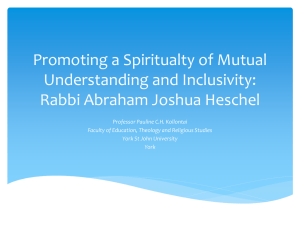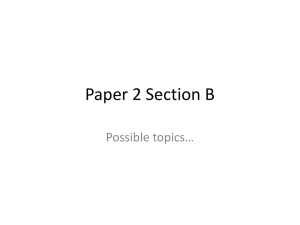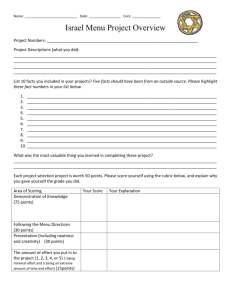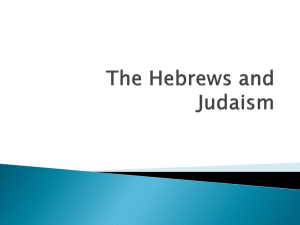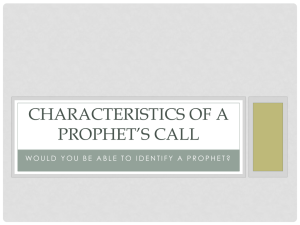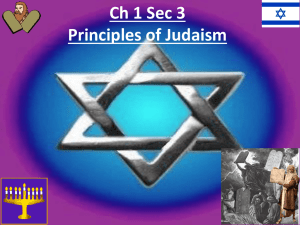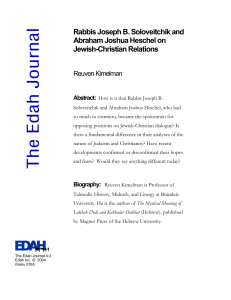Theological Politics
advertisement
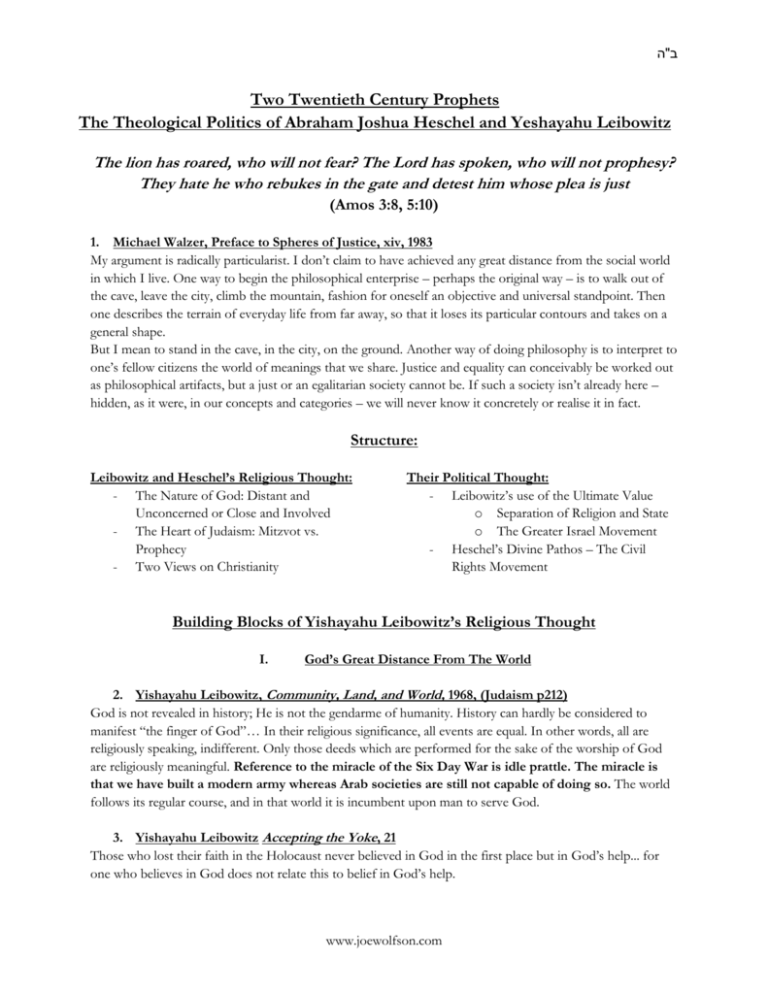
ב"ה Two Twentieth Century Prophets The Theological Politics of Abraham Joshua Heschel and Yeshayahu Leibowitz The lion has roared, who will not fear? The Lord has spoken, who will not prophesy? They hate he who rebukes in the gate and detest him whose plea is just (Amos 3:8, 5:10) 1. Michael Walzer, Preface to Spheres of Justice, xiv, 1983 My argument is radically particularist. I don’t claim to have achieved any great distance from the social world in which I live. One way to begin the philosophical enterprise – perhaps the original way – is to walk out of the cave, leave the city, climb the mountain, fashion for oneself an objective and universal standpoint. Then one describes the terrain of everyday life from far away, so that it loses its particular contours and takes on a general shape. But I mean to stand in the cave, in the city, on the ground. Another way of doing philosophy is to interpret to one’s fellow citizens the world of meanings that we share. Justice and equality can conceivably be worked out as philosophical artifacts, but a just or an egalitarian society cannot be. If such a society isn’t already here – hidden, as it were, in our concepts and categories – we will never know it concretely or realise it in fact. Structure: Leibowitz and Heschel’s Religious Thought: - The Nature of God: Distant and Unconcerned or Close and Involved - The Heart of Judaism: Mitzvot vs. Prophecy - Two Views on Christianity Their Political Thought: - Leibowitz’s use of the Ultimate Value o Separation of Religion and State o The Greater Israel Movement - Heschel’s Divine Pathos – The Civil Rights Movement Building Blocks of Yishayahu Leibowitz’s Religious Thought I. God’s Great Distance From The World 2. Yishayahu Leibowitz, Community, Land, and World, 1968, (Judaism p212) God is not revealed in history; He is not the gendarme of humanity. History can hardly be considered to manifest “the finger of God”… In their religious significance, all events are equal. In other words, all are religiously speaking, indifferent. Only those deeds which are performed for the sake of the worship of God are religiously meaningful. Reference to the miracle of the Six Day War is idle prattle. The miracle is that we have built a modern army whereas Arab societies are still not capable of doing so. The world follows its regular course, and in that world it is incumbent upon man to serve God. 3. Yishayahu Leibowitz Accepting the Yoke, 21 Those who lost their faith in the Holocaust never believed in God in the first place but in God’s help... for one who believes in God does not relate this to belief in God’s help. www.joewolfson.com II. Judaism As Service of God Through Mitzvot 4. Yishayahu Leibowitz, ‘Religious Praxis’ (1953), Judaism pp4-5 The essence of religion is not the information it provides but the demand made of man to worship God. Jewish faith is nothing but its system of mitzvoth, which is the embodiment of Judaism... Apart from them Judaism does not exist. Many great sages who succeeded Maimonides and are celebrated as saintly figures would have been regarded by him as idolaters, and he would no doubt, have excommunicated them and regarded them as deserving extermination. Yet later generations through which Judaism was passed down considered the various opposed views to be words of the living God. It was thus not beliefs or opinions that determined the identity of Judaism. Its continuity was that of its religious praxis. That is why the Hassidic movement remained an integrated and live member of the Jewish body despite the psychic distance and abyss of enmity which separated Hassidim from their opponents… Compare this with the fate of the Sabbatean movement… Building Blocks of Abraham Joshua Heschel’s Religious Thought: I. God’s Involvement With The World 5. A.J. Heschel, God and Man, ‘The Prophets’, pp224-231 God responds to human beings in an intimate and subjective manner experiencing joy or sorrow, pleasure or wrath. He has a stake in the human situation... Man is not only an image of God; he is a perpetual concern of God. Whatever man does affects not only his own life, but also the life of God insofar as it is directed to man. The import of man raises him beyond the level of mere creature. He is a consort, a partner, a factor in the life of God. Man’s attitudes may affect the life of God, who stands in an intimate relation to His world... God is never neutral, never beyond good and evil 6. Abraham Joshua Heschel, ‘Why We Pray’, from The Wisdom of Heschel The world is aflame with evil and atrocity; the scandal of perpetual desecration of the world cries to high heaven. And we, coming face to face with it, are either involved as callous participants or, at best, remain indifferent onlookers.... We pray because the disproportion of human misery and human compassion is so enormous. We pray because our grasp of the depth of suffering is comparable to the scope of perception of a butterfly flying over the Grand Canyon. We pray because of the experience of the dreadful incompatibility of how we live and what we sense. II. The Role of The Prophets 7. A.J. Heschel, What Manner of Man is the Prophet? ‘The Prophets’, p3 What manner of man is the prophet? A student of philosophy who turns from the discourses of the great metaphysicians to the orations of the prophets may feel as if he were going from the realm of the sublime to an area of trivialities. Instead of dealing with the timeless issues of being and becoming, of matter and form, of definitions and demonstrations, he is thrown into orations about widows and orphans, about the corruption of judges and affairs of the market place. Instead of showing us a way through the elegant mansions of the mind, the prophets take us to the slums. The world is a proud place, full of beauty, but the prophets are scandalised, and rave as if the whole world were a slum. They make much ado about paltry 2 things, lavishing excessive language upon trifling subjects. What if somewhere in ancient Palestine poor people have not been treated properly by the rich? Why such immoderate excitement? Why such intense indignation? The things that horrified the prophets are even now daily occurrences all over the world. There is no society to which Amos’s words would not apply. Hear this, you who trample upon the needy, And bring the poor of the land to an end, Saying: When will the new moon be over That we may sell grain, And the Sabbath, That we may offer wheat for sale, That we may make the ephah small and the shekel great, And deal deceitfully with false balances, That we may buy the poor for silver, And the needy for a pair of sandals, And sell the refuse of the wheat? Leibowitz’s Politics – The Attribution of Ultimate Value I. The Separation of Religion and State 8. Yishayahu Leibowitz, ‘The Religious Significance of the State of Israel’, 1975, Judaism 214-5 I wish to introduce myself at the outset as one who hasn’t been at all disappointed by the state of Israel. For me, the state of Israel has fulfilled all the hopes I had for it... It seems to me that ever since I reached maturity and became a Zionist, Zionism meant for me the endeavour to liberate Jews from being ruled by the Gentiles. The state of Israel completely satisfies the demand for freedom from domination by others. To the extent that I am able to recall my opinions of fifty years ago, I believe that it never occurred to me to assign to the state – any state, including Israel – the function of realising values, whether educational, cultural, or moral; certainly not the religious values of Torah and Mitzvoth. I believe that no state whatsoever, in the past, present, or any foreseeable future, in any society, in any era, in any culture, including the Jewish culture, ever was or will ever be anything but a secular institution. The function of the state is essentially secular. It is not the service of God... Religion, that is, man’s recognition of his duty to serve God, cannot be integrated with the machinery of government. 9. Aviezer Ravitzky and Y. Leibowitz, Arguments of Faith and Philosophy, pp56, 62-63 Ravitzky: When you speak of the separation of religion and state you speak from the point of view of a struggle that allows religion to be critical and different. You speak about Elijah and speaking truth to power, whereas it seems to me that Shulamit Aloni and many other secular liberals (who also demand separation of religion and state) would simply want Elijah to go to the synagogue and leave Ahab to do as he wishes Leibowitz: The state in itself is the most dangerous instrument not because it has the authority to coerce but because it has the power to coerce. Therefore it is very important that in the framework of an established state... there be found in it an opposition, a restraining force on power. And I think that if there is at all to be a political function to religion – against those who claim that religion is solely a 3 personal matter – then perhaps this is its function. To be a fundamental opposition to the state, to authority because it is the authority. That is to say, authority – you are not the ultimate authority II. The Argument Against The Greater Israel Movement 10. Yishayahu Leibowitiz, ‘A Jewish or an Unpartitioned State’, Judaism p236 Regarding the state as an intrinsic value is the essence of fascism, if this is true in general, it is all the more true when the values of “the Judaism of Torah” are attached to it... The land of Israel is a Holy Land and the Temple Mount is a holy place only by virtue of the Mitzvoth linked to these locations but the idea that a specific country or location has an intrinsic “holiness” is an indubitably idolatrous idea… After all that has been said about the “religious” and pseudo-religious and even halakhic reasons for maintaining Jewish rule over the territories and their Arab inhabitants, and for the annexation of the territories to the state of Israel, I have nothing to add to what already appeared in the Scriptures, the same Scriptures to which the national religious fools appeal for support of their lust for conquest. Two thousand six hundred years ago the prophet Ezekiel foresaw Gush Emunim (the Greater Israel movement) and the arguments of its rabbis and leaders. His words read as though he knew in advance the words and terms they would use, and he already gave them a reply which penetrates to the heart of the matter. Then the word of God came to me saying, Son of man, They that inhabit these waste places of the land of Israel speak, saying, Abraham was one man and yet he inherited the land, but we are many; the land is given us for inheritance. Therefore say to them, thus says the Lord God: You eat with the blood and lift up your eyes towards your idols, and shed blood; and shall you possess the land? You stand upon your sword, you carry out disgusting deeds, and you defile every man his neighbour’s wife; and shall you possess the land? These words were not meant for Ezekiel’s generation only. He said them to all generations, and especially to the generation of the “liberators of the Holy Land” in our time. The Jewish people have legitimate claims to this country. But these claims have no “religious cover”. To speak of the divine promise to Abraham and his issue as a gratuitous gift, to ignore the conditions of the promise, and to disregards the obligations it confers on the receivers is a degradation and desecration of the religious faith. Heschel’s Politics – ‘Some Are Guilty, All are Responsible’ The Civil-Rights Movement and The Exodus 11. A.J. Heschel, ‘Religion and Race’ (1963) and ‘The White Man on Trial’ (1964), in The Insecurity of Freedom’, pp85, 103 Religion and Race. How can the two be uttered together? To act in the spirit of religion is to unite what lies apart, to remember that humanity as a whole is God’s beloved child. To act in the spirit of race is to sunder, to slash, to dismember the flesh of living humanity. Is this the way to honour a father: to torture his child? How can we hear the word “race” and feel no self-reproach?... 4 The exodus began but it is far from being completed. In fact, it was easier for the children of Israel to cross the Red Sea than for a Negro to cross certain university campuses.To think of man in terms of white, black or yellow is more than an error. It is an eye disease, a cancer of the soul. The tragedy of Pharoah was the failure to realise that the Exodus from slavery could have spelled redemption for both Israel and Egypt. Would that Pharoah and the Egyptians had joined the Israelites in the desert and together stood at the foot of Sinai! The Negro problem adds a spiritual purpose to our lives as Americans: No person can be kept apart. All men are involved in the predicament of one man. 12. ‘Praying with my legs’ 10. Interview on NBC-TV, 1972, ten days before his death Early in my life, my great love was for learning, studying. And the place where I preferred to live was my study and books and writing and thinking. I’ve learned from the prophets that I have to be involved in the affairs of man, in the affairs of suffering man 13. On marching with King at Selma as related by his family ‘I felt that my legs were praying... I so regret that the vast numbers of Jews participating in it [the civil rights movement] are unaware of what it means in terms of the prophetic traditions’ 14. Martin Luther King, speaking at Heschel’s 60th Birthday Celebrations Heschel is indeed a truly great prophet. Here and there we find those who refuse to remain silent behind the safe security of stained glass windows, and they are forever seeking to make the great ethical insights of our Judeo-Christian heritage relevant in this day and in this age. I feel that Rabbi Heschel is one of the person who is relevant at all times, always standing with prophetic insights to us through these difficult days. 15. Samuel Dresner, ‘A.J. Heschel, Ten Years After His Death’, 1982, p5 Abraham Joshua Heschel died on the Sabbath in his sleep, on 23 December 1972. At his bedside were two books: one a Hasidic classic, the other a work on the war in Vietnam. The combination was symbolic. The two books represented two different worlds – eternal spirit and mundane present, mysticism and diplomacy, heaven and earth. Most choose one or the other. Heschel refused to ignore either, preferring to live in the tension of the polarity. 5
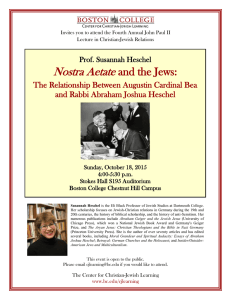
![September 22, 2015 Sermon Kol Nidrei Th[...]](http://s3.studylib.net/store/data/006883231_1-c85e16857411579da31e913d72d9dc6b-300x300.png)
